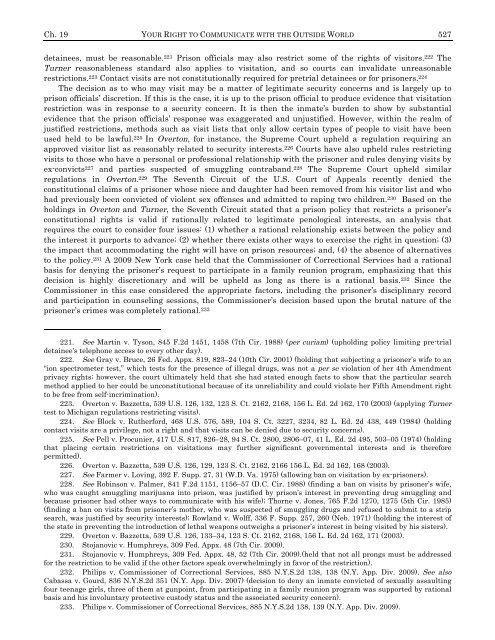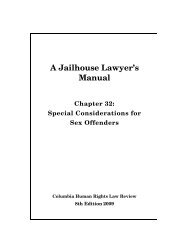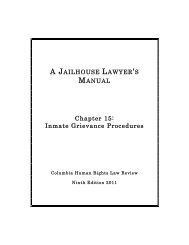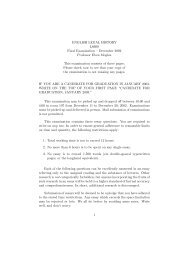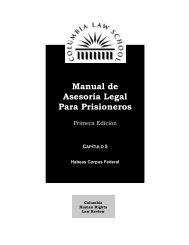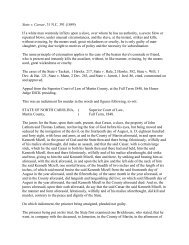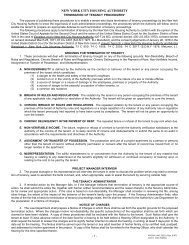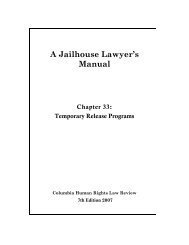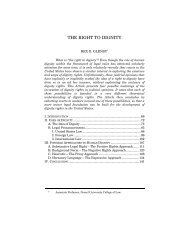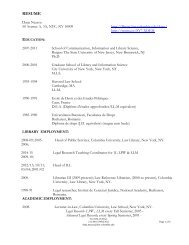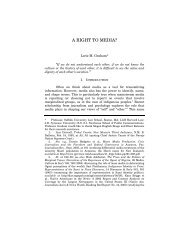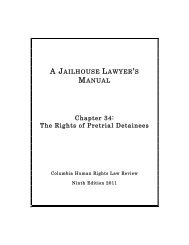Your Right to Communicate With the Outside World - Columbia Law ...
Your Right to Communicate With the Outside World - Columbia Law ...
Your Right to Communicate With the Outside World - Columbia Law ...
- No tags were found...
Create successful ePaper yourself
Turn your PDF publications into a flip-book with our unique Google optimized e-Paper software.
Ch. 19 YOUR RIGHT TO COMMUNICATE WITH THE OUTSIDE WORLD 527detainees, must be reasonable. 221 Prison officials may also restrict some of <strong>the</strong> rights of visi<strong>to</strong>rs. 222 TheTurner reasonableness standard also applies <strong>to</strong> visitation, and so courts can invalidate unreasonablerestrictions. 223 Contact visits are not constitutionally required for pretrial detainees or for prisoners. 224The decision as <strong>to</strong> who may visit may be a matter of legitimate security concerns and is largely up <strong>to</strong>prison officials’ discretion. If this is <strong>the</strong> case, it is up <strong>to</strong> <strong>the</strong> prison official <strong>to</strong> produce evidence that visitationrestriction was in response <strong>to</strong> a security concern. It is <strong>the</strong>n <strong>the</strong> inmate’s burden <strong>to</strong> show by substantialevidence that <strong>the</strong> prison officials’ response was exaggerated and unjustified. However, within <strong>the</strong> realm ofjustified restrictions, methods such as visit lists that only allow certain types of people <strong>to</strong> visit have beenused held <strong>to</strong> be lawful. 225 In Over<strong>to</strong>n, for instance, <strong>the</strong> Supreme Court upheld a regulation requiring anapproved visi<strong>to</strong>r list as reasonably related <strong>to</strong> security interests. 226 Courts have also upheld rules restrictingvisits <strong>to</strong> those who have a personal or professional relationship with <strong>the</strong> prisoner and rules denying visits byex-convicts 227 and parties suspected of smuggling contraband. 228 The Supreme Court upheld similarregulations in Over<strong>to</strong>n. 229 The Seventh Circuit of <strong>the</strong> U.S. Court of Appeals recently denied <strong>the</strong>constitutional claims of a prisoner whose niece and daughter had been removed from his visi<strong>to</strong>r list and whohad previously been convicted of violent sex offenses and admitted <strong>to</strong> raping two children. 230 Based on <strong>the</strong>holdings in Over<strong>to</strong>n and Turner, <strong>the</strong> Seventh Circuit stated that a prison policy that restricts a prisoner’sconstitutional rights is valid if rationally related <strong>to</strong> legitimate penological interests, an analysis thatrequires <strong>the</strong> court <strong>to</strong> consider four issues: (1) whe<strong>the</strong>r a rational relationship exists between <strong>the</strong> policy and<strong>the</strong> interest it purports <strong>to</strong> advance; (2) whe<strong>the</strong>r <strong>the</strong>re exists o<strong>the</strong>r ways <strong>to</strong> exercise <strong>the</strong> right in question; (3)<strong>the</strong> impact that accommodating <strong>the</strong> right will have on prison resources; and, (4) <strong>the</strong> absence of alternatives<strong>to</strong> <strong>the</strong> policy. 231 A 2009 New York case held that <strong>the</strong> Commissioner of Correctional Services had a rationalbasis for denying <strong>the</strong> prisoner’s request <strong>to</strong> participate in a family reunion program, emphasizing that thisdecision is highly discretionary and will be upheld as long as <strong>the</strong>re is a rational basis. 232 Since <strong>the</strong>Commissioner in this case considered <strong>the</strong> appropriate fac<strong>to</strong>rs, including <strong>the</strong> prisoner’s disciplinary recordand participation in counseling sessions, <strong>the</strong> Commissioner’s decision based upon <strong>the</strong> brutal nature of <strong>the</strong>prisoner’s crimes was completely rational. 233221. See Martin v. Tyson, 845 F.2d 1451, 1458 (7th Cir. 1988) (per curiam) (upholding policy limiting pre-trialdetainee's telephone access <strong>to</strong> every o<strong>the</strong>r day).222. See Gray v. Bruce, 26 Fed. Appx. 819, 823–24 (10th Cir. 2001) (holding that subjecting a prisoner’s wife <strong>to</strong> an“ion spectrometer test,” which tests for <strong>the</strong> presence of illegal drugs, was not a per se violation of her 4th Amendmentprivacy rights; however, <strong>the</strong> court ultimately held that she had stated enough facts <strong>to</strong> show that <strong>the</strong> particular searchmethod applied <strong>to</strong> her could be unconstitutional because of its unreliability and could violate her Fifth Amendment right<strong>to</strong> be free from self-incrimination).223. Over<strong>to</strong>n v. Bazzetta, 539 U.S. 126, 132, 123 S. Ct. 2162, 2168, 156 L. Ed. 2d 162, 170 (2003) (applying Turnertest <strong>to</strong> Michigan regulations restricting visits).224. See Block v. Ru<strong>the</strong>rford, 468 U.S. 576, 589, 104 S. Ct. 3227, 3234, 82 L. Ed. 2d 438, 449 (1984) (holdingcontact visits are a privilege, not a right and that visits can be denied due <strong>to</strong> security concerns).225. See Pell v. Procunier, 417 U.S. 817, 826–28, 94 S. Ct. 2800, 2806–07, 41 L. Ed. 2d 495, 503–05 (1974) (holdingthat placing certain restrictions on visitations may fur<strong>the</strong>r significant governmental interests and is <strong>the</strong>reforepermitted).226. Over<strong>to</strong>n v. Bazzetta, 539 U.S. 126, 129, 123 S. Ct. 2162, 2166 156 L. Ed. 2d 162, 168 (2003).227. See Farmer v. Loving, 392 F. Supp. 27, 31 (W.D. Va. 1975) (allowing ban on visitation by ex-prisoners).228. See Robinson v. Palmer, 841 F.2d 1151, 1156–57 (D.C. Cir. 1988) (finding a ban on visits by prisoner’s wife,who was caught smuggling marijuana in<strong>to</strong> prison, was justified by prison’s interest in preventing drug smuggling andbecause prisoner had o<strong>the</strong>r ways <strong>to</strong> communicate with his wife); Thorne v. Jones, 765 F.2d 1270, 1275 (5th Cir. 1985)(finding a ban on visits from prisoner’s mo<strong>the</strong>r, who was suspected of smuggling drugs and refused <strong>to</strong> submit <strong>to</strong> a stripsearch, was justified by security interests); Rowland v. Wolff, 336 F. Supp. 257, 260 (Neb. 1971) (holding <strong>the</strong> interest of<strong>the</strong> state in preventing <strong>the</strong> introduction of lethal weapons outweighs a prisoner’s interest in being visited by his sisters).229. Over<strong>to</strong>n v. Bazzetta, 539 U.S. 126, 133–34, 123 S. Ct. 2162, 2168, 156 L. Ed. 2d 162, 171 (2003).230. S<strong>to</strong>janovic v. Humphreys, 309 Fed. Appx. 48 (7th Cir. 2009).231. S<strong>to</strong>janovic v. Humphreys, 309 Fed. Appx. 48, 52 (7th Cir. 2009).(held that not all prongs must be addressedfor <strong>the</strong> restriction <strong>to</strong> be valid if <strong>the</strong> o<strong>the</strong>r fac<strong>to</strong>rs speak overwhelmingly in favor of <strong>the</strong> restriction).232. Philips v. Commissioner of Correctional Services, 885 N.Y.S.2d 138, 138 (N.Y. App. Div. 2009). See alsoCabassa v. Gourd, 836 N.Y.S.2d 351 (N.Y. App. Div. 2007) (decision <strong>to</strong> deny an inmate convicted of sexually assaultingfour teenage girls, three of <strong>the</strong>m at gunpoint, from participating in a family reunion program was supported by rationalbasis and his involuntary protective cus<strong>to</strong>dy status and <strong>the</strong> associated security concern).233. Philips v. Commissioner of Correctional Services, 885 N.Y.S.2d 138, 139 (N.Y. App. Div. 2009).


